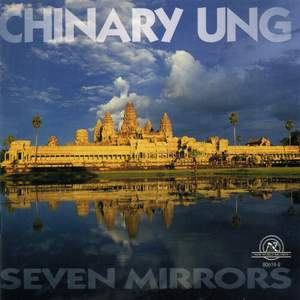The work of Cambodian-American composer Chinary Ung (b. 1942) represents one of the more successful attempts to accomplish a musical integration of East and West, resulting in a style that is uniquely his own. In general, Ung's music is resplendent with lush romantic harmonies, rhythmic complexities, and lyrical melodic passages, an amalgamation that, together with his own idiosyncratic compositional technique, has evolved over the course of time.
Both Asian and Western elements are readily discernible in Spiral VI (1992), probably one of Ung's best examples of achieving a true integration of these ideas. Spiral VI is constantly changing, expanding, or contracting, and has been described as having a "floating" feeling despite its precise rhythmic notation. Seven Mirrors (1997) is a challenging solo piano work that is comprised of seven short virtuosic movements, each of a different character, but all linked either musically or thematically. Familiar piano gestures reflect postmodern characteristics that prevailed in the last quarter of the twentieth century, and each movement is assigned a fanciful title that "describes" the nature of the music.
Grand Alap (1996) has a fascinating array of sonic effects, both in the instrumental and vocal parts. More than thirteen different percussion instruments are in constant motion under the amplified cello passages, providing continuity and unity to the work.
In the words of the composer, the source of inspiration for Grand Spiral ("Desert Flowers Bloom") (1992) was "the image of a translucent piece of sculpture that is constantly moving and rotating in the desert while reflecting sunlight as perhaps a prism would." The post-impressionist aspect of Grand Spiral should come as no surprise since Debussy was one of Ung's early heroes of composition. This work shows Ung to be a consummate orchestrator, with an uncanny sense of how to combine instrumental colors in order to produce his desired result.





